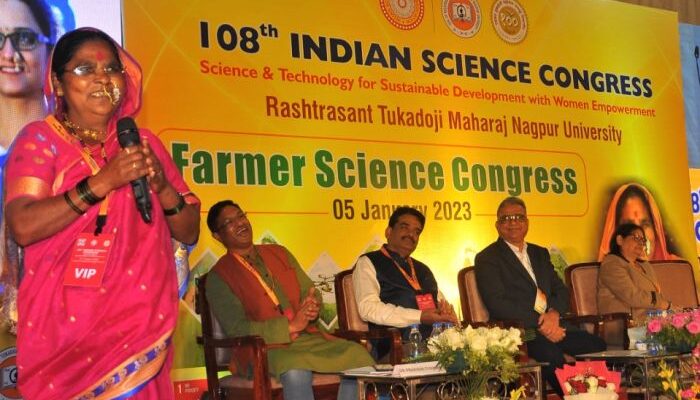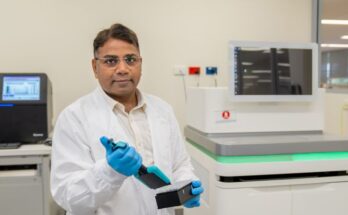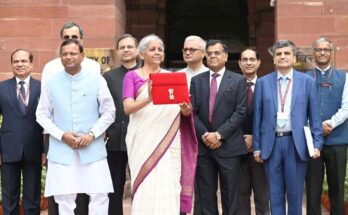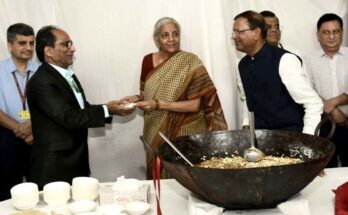Farmers’ dependency on the market for seeds and fertilisers is the root cause of farmer suicides and the overall agricultural distress, said the ‘Beej Mata’ (Seed Mother). Padma Shri Rahibai Popere, the conservationist and farmer. She was addressing the inaugural session of the Farmer’s Science Congress, a special congregation, organised as part of the 108th Indian Science Congress hosted by Rashtrasant Tukadoji Maharaj Nagpur University (RTMNU).
Chemical-free food in India is only possible if farmers embrace traditional organic farming using native seeds. Countless species of wild vegetables have vanished because of chemical herbicides. Chemical pesticides gradually kill the soil potency.
Known for her unique Seed Bank of more than 200 indigenous varieties, Rahibai has trained more than 3,500 female farmers about seed preservation and soil protection and organised them in self-help groups.
You may also like to read: ICRISAT intern wins top award in the US for developing bio-insecticide
Even the scientists were stunned when illiterate Rahibai explained traditional as well as her self-developed methods of saving plants and preserving seeds. While appealing to the farmers to save the soil from toxic chemicals, Rahibai suggested food choices that, ‘All the food that looks good may not be necessarily healthy’. Vice Chancellor Dr. Subhash Chaudhari, welcomed Rahibai with a memento of the Farmer’s Science Congress.
Dr. Basanta Kumar Das, Director, ICAR-Central Fisheries Research Institute, Kolkata, (ICAR-CIFRI) highlighted the dire need of technological reform in agriculture. “The nation has made tremendous progress in foodgrain production and our farmers’ meticulous efforts have made the biggest contribution to it. However, it is seen that the economic condition of the farmers has not improved much. Hence, effective use of modern science and technology is important for the progress of agriculture,” he said.
Dr. Prakash Kadu, Associate Dean, Punjabrao Deshmukh Krishi Vidyapeeth, Nagpur elaborated on the services offered by his university to the farmers. He suggested that encouraging women’s self-help groups to form farmer producer companies (FPC) and food processing businesses would be a great idea.
Dr. Ashish Paturkar, Vice-Chancellor, Maharashtra Animal and Fishery Sciences University (MAFSU) proposed that animal husbandry is the only way to double the income of farmers. Dr. Subhash Chaudhari, Vice-Chancellor, RTM Nagpur University; Dr. Vijay Laxmi Saxena, General President, ISCA; and Dr. S Ramakrishna, General Secretary (Membership Affairs), ISCA were present during the session.
You may also like to read: ICAR-NIHSAD transfers technology of H9N2 vaccine for chickens for commercial production
The Farmer’s Science Congress discussed traditional as well as modern agricultural science to derive the best possible farming practices for the farmers.
Scientists and experts from Dr. Punjabrao Deshmukh Krishi Vidyapeeth, Maharashtra Animal and Fishery Sciences University, Central Institute for Cotton Research and Central Citrus Research Institute presented their latest research in the technical session conducted by Dr. Rajkumar Khapekar, BOS member of Balbharti and RTMNU. This session was about the utilisation of science for the betterment of farmers through sustainable agriculture and animal husbandry.
Success stories of progressive farmers
Nothing can inspire a farmer more than a success story of a fellow farmer. A panel discussion of progressive farmers was organised at the Farmer’s Science Congress where 16 farmers from across the Vidarbha region in Maharashtra shared their stories of commercial success in farming and various agro-businesses. All these farmers not only gave key information on their specific areas of expertise but also offered free consultation and support to any farmer in future.
Central Cotton Research Institute displayed citrus fruits, value-added citrus products, citrus plants and Mitra Keet at their stall. Seeds and micronutrients were displayed on other stalls. Dr. Reema Kamlani conducted the programme and the vote of thanks was presented by Dr. Prakash Itankar.




